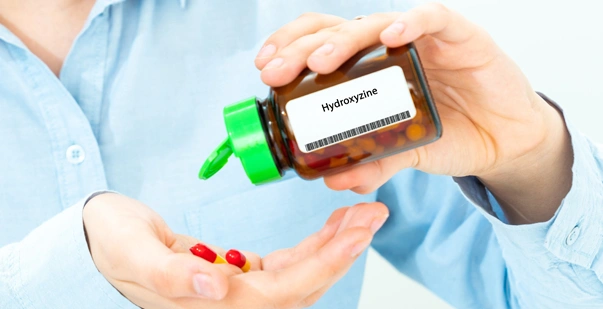Table of Content(s)
- Introduction
- What are the risks of using hydroxyzine with other medications?
- What are the signs of serious heart problems with hydroxyzine?
- How to address concerns about heart palpitations with hydroxyzine?
- What Are the Common Symptoms of Taking Hydroxyzine in the Human Body?
- Who should avoid taking hydroxyzine due to heart concerns?
- What is the lowest dose of hydroxyzine?
- How can I monitor my heart health while taking hydroxyzine?
- What factors can affect the hydroxyzine dosage?
- Conclusion
Hydroxyzine is usually prescribed for anxiety, allergies, and sleep issues, but its safety for heart patients is a concern. Hydroxyzine heart palpitations are a side effect, especially in individuals with pre-existing heart conditions. It’s crucial to consult a healthcare provider before taking hydroxyzine if you have a heart condition or high blood pressure. They will evaluate the risks and determine a safe dosage to reduce any adverse effects on heart health.
So, let us study the risks of using hydroxyzine with other medications in ACLS and its potential side effects for heart patients.
Master ACLS Now
Get ACLS certified with confidence
What are the risks of using hydroxyzine with other medications?
Hydroxyzine can interact with several medications and add to the risk of side effects. The key risks include:
- Increased Sedation: When combined with sleeping pills, narcotic pain medications, or muscle relaxants.
- Serious Heart Problems: When used with antibiotics, antidepressants, antipsychotics, and heart rhythm medications.
- Drug Metabolism Interactions: With medications like fluoxetine and codeine.
- Irregular Heart Rhythms: When combined with amiodarone and sotalol.
Read more: ACLS And Adenosine
What are the signs of serious heart problems with hydroxyzine?
Signs of serious heart problems with hydroxyzine may include:
- Rapid or irregular heartbeat: If you experience a fast or pounding heartbeat, it is a sign of a serious heart problem while taking hydroxyzine.
- Chest pain: Headache accompanied by chest pain indicates a heart-related issue.
- Severe dizziness or fainting: Feeling lightheaded, dizzy, or fainting is a sign of a serious heart problem due to the usage of hydroxyzine.
- Seizures: Although rare, hydroxyzine can potentially trigger seizures in some individuals.
How to address concerns about heart palpitations with hydroxyzine?
Hydroxyzine is an antihistamine, and an anxiolytic. It causes cardiac side effects, particularly long QT syndrome and torsade de pointes, which are life-threatening abnormal heart rhythms. Here are some steps you can take to address this issue:
- Report Symptoms:Inform a healthcare professional about any heart-related symptoms, such as palpitations, fluttering, or fainting, as soon as they occur.
- Monitor and Adjust Dose: If you continue taking hydroxyzine, you can reduce the dosage to minimize the risk of cardiac side effects.
- Consider Alternative Medications:If you have a history of heart rhythm problems or are taking medications that interact with hydroxyzine, you must consider taking professional advice.
Master ACLS Now
Get ACLS certified with confidence
What Are the Common Symptoms and Side Effects of Hydroxyzine in the Human Body?
The common symptoms of hydroxyzine include the following:
Allergic Reaction:
- Hives
- Difficulty breathing
- Swelling of the face, lips, tongue, or throat
Cardiac Side Effects:
- Fast or pounding heartbeats
- Headache with chest pain
- Severe dizziness, fainting
Seizures (convulsions)
- Dry mouth
- Difficulty swallowing
- Difficulty speaking
Nervous System Side Effects:
- Sleepiness
- Headache
- Tiredness
- Tremors
Who should avoid taking hydroxyzine due to heart concerns?
The following individuals must avoid taking the medication:
- Individuals with a history of heart rhythm problems.
- Those with a family history of QT prolongation or sudden cardiac death.
- Patients with liver or kidney issues.
- Elderly individuals, especially those taking medications that prolong the QT interval.
What is the lowest dose of hydroxyzine?
The lowest recommended dose of hydroxyzine depends on the specific condition being treated. For anxiety and tension, the lowest recommended dose for adults is 50 mg taken four times a day. For itching due to allergies, the lowest recommended dose for adults is 25 mg taken three to four times a day.
How to monitor heart health while taking hydroxyzine?
Here is how you can monitor your heart health when taking hydroxyzine:
- Regularly check your heart rate and rhythm
- Monitor for signs of QT prolongation
- Consult your doctor if you experience any heart-related symptoms
Master ACLS Now
Get ACLS certified with confidence
What factors can affect the hydroxyzine dosage?
Several factors can affect the dosage of hydroxyzine, including:
- Age: Older adults require a lower dose of hydroxyzine due to an increased risk of side effects
- Medical conditions: Medical conditions, such as heart problems, and liver or kidney problems, require dosage adjustments.
- Medications: Hydroxyzine interacts with other medications, such as antidepressants, antihistamines, and drugs that cause irregular heart rhythms.
- Pregnancy and breast-feeding: Hydroxyzine is not recommended during pregnancy or while breastfeeding. It may cause harm to the fetus or pass into breast milk.
It is important to discuss your medical history, current medications, and any concerns with a healthcare professional. This will help determine the appropriate dosage of hydroxyzine for your specific situation.
Read more: Amiodarone And ACLS
Conclusion
Hydroxyzine heart palpitations are a major side-effect of the drug. It may not be safe for heart patients as it can cause other serious heart problems. It is important to consult with a healthcare provider before taking hydroxyzine if you have a heart condition or high blood pressure. Consider the risks of using hydroxyzine with other medications . It can interact with certain drugs and increase the risk of side effects.







